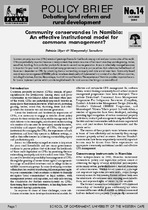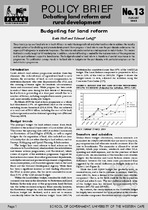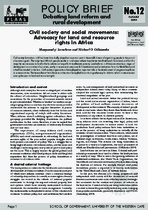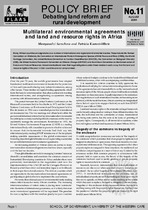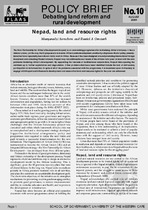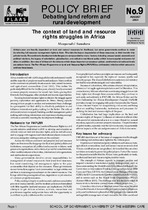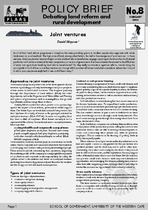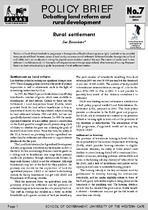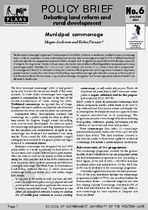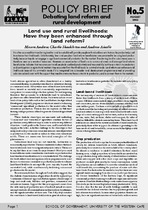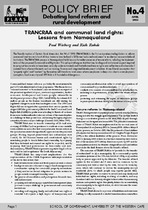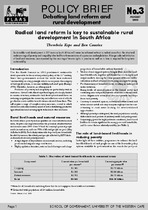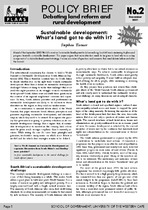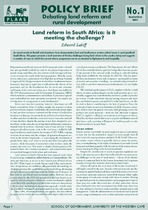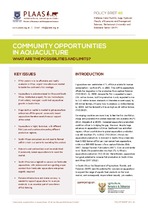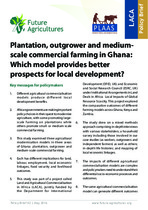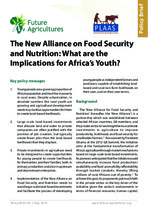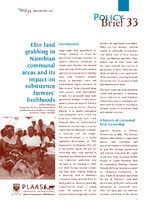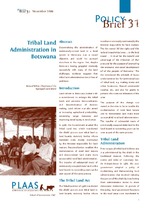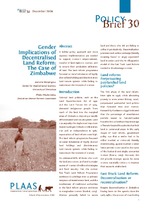Policy Briefs: Recent submissions
Now showing items 121-140 of 144
-
Community conservancies in Namibia: An effective institutional model for commons management?
(Institute for Poverty, Land and Agrarian Studies, University of the Western Cape, 2004)Common property resources (CPRs) remain of great significance for livelihoods among rural and poor communities of the world. CPRs are particularly important because in many contexts they remain resources of last resort ... -
Budgeting for land reform
(Institute for Poverty, Land and Agrarian Studies, University of the Western Cape, 2004)The primary purpose of land reform in South Africa is to redistribute agricultural and other land in order to address the racially skewed pattern of landholding and promote development. Slow progress in land reform over ... -
Civil society and social movements: Advocacy for land and resource rights in Africa
(Institute for Poverty, Land and Agrarian Studies, University of the Western Cape, 2004)Civil society formations in Africa have historically played an important part in the establishment of organising people in the pursuit of common goals. The majority of Africa’s people reside in rural areas where they ... -
Multilateral environmental agreements and land and resource rights in Africa
(Institute for Poverty, Land and Agrarian Studies, University of the Western Cape, 2004)Many African countries are signatories to a number of international and regional environmental treaties. These include the Ramsar Convention on Wetlands, the Convention on International Trade in Endangered Species of Wild ... -
Nepad, land and resource rights
(Institute for Poverty, Land and Agrarian Studies, University of the Western Cape, 2004)The New Partnership for Africa’s Development (Nepad) is an overarching programme for revitalising Africa’s fortunes. It has a visionary tone, yet the way that it proposes to overcome Africa’s underdevelopment uncritically ... -
The context of land and resource rights struggles in Africa
(Institute for Poverty, Land and Agrarian Studies, University of the Western Cape, 2004)Africa’s poor are heavily dependent on land and natural resources for livelihood, but some governments continue to resist transferring full resource management rights to them. This risks the loss or degradation of these ... -
Joint ventures
(Institute for Poverty, Land and Agrarian Studies, University of the Western Cape, 2004)South Africa s land reform programme is based on the state providing grants to landless people who negotiate with white landowners to purchase land. The high price of land, among other factors, has led to the emergence ... -
Rural settlement
(Institute for Poverty, Land and Agrarian Studies, University of the Western Cape, 2004)The focus of South Africa s land reform programme is the acquisition of land and securing tenure rights. Land reform has provided many people with land. However, access to land is only one component of settlement. Settlement ... -
Municipal commonage
(Institute for Poverty, Land and Agrarian Studies, University of the Western Cape, 2004)The Municipal Commonage Programme of the Department of Land Affairs (DLA) aims to enable poor residents to access commonage lands in order to supplement incomes and enhance food security. New commonage accounted for 31% ... -
Land use and rural livelihoods: Have they been enhanced through land reform?
(Institute for Poverty, Land and Agrarian Studies, University of the Western Cape, 2003)It is often assumed that transferring land to rural households will provide people with valuable assets that can be productively used to enhance their livelihoods. Unfortunately, few rural people or land reform beneficiaries ... -
TRANCRAA and communal land rights: Lessons from Namaqualand
(Institute for Poverty, Land and Agrarian Studies, University of the Western Cape, 2003)The Transformation of Certain Rural Areas Act, Act 94 of 1998 (TRANCRAA) is the first comprehensive legislation to reform communal land tenure in South Africa. It aims to transfer land in 23 former coloured rural areas ... -
Radical land reform is key to sustainable rural development in South Africa
(Institute for Poverty, Land and Agrarian Studies, University of the Western Cape, 2002)Sustainable rural development in 21st century South Africa will never be achieved without a radical assault on the structural underpinnings of poverty and inequality inherited from three centuries of oppression and ... -
Sustainable development: What's land got to do with it?
(Institute for Poverty, Land and Agrarian Studies, University of the Western Cape, 2001)Ahead of the September 2002 World Summit on Sustainable Development in Johannesburg, South Africa is reviewing its plans and progress towards sustainable development. This paper argues that more attention needs to be given ... -
Land Reform in South Africa: Is it meeting the challenge?
(Institute for Poverty, Land and Agrarian Studies, University of the Western Cape, 2001)As recent events at Brendell and elsewhere have demonstarted, land and landlessness remain critical issues in post-apartheid South Africa. This paper presents a brief overview of the key challenges facing land reform in ... -
Community opportunities in aquaculture: what are the possibilities and limits?
(Institute for Poverty, Land and Agrarian Studies, University of the Western Cape, 2016)Aquaculture now contributes 47% of fish available for human consumption – up from 9% in 1980. This shift to aquaculture offsets the stagnation in the production from capture fisheries (FAO 2012). By 2030, demand for ... -
Plantation, outgrower and medium-scale commercial farming in Ghana: which model provides better prospects for local development?
(Institute for Poverty, Land and Agrarian Studies, University of the Western Cape and Future Agricultures Consortium, 2016)African governments are making important policy choices in their quest to modernise agriculture, with some promoting largescale farming on plantations while others promote small- or medium-scale commercial farming. -
The new alliance on food security and nutrition: what are the implications for Africa’s youth?
(Future Agricultures Consortium, 2016)Young people are a growing proportion of Africa’s population and most live in poverty in rural areas. Despite urbanisation, in absolute numbers the rural youth are growing and agricultural development needs to prioritise ... -
Elite land grabbing in Namibian communal areas and its impact on subsistence farmers’ livelihoods
(PLAAS, University of the Western Cape, 2011)This brief examines some emerging trends and dynamics in changing power relations in rural Namibian communities due to emerging new elites and the threats to subsistence farmers’ access to communal land and ... -
Tribal land administration in Botswana
(PLAAS, University of the Western Cape, 2009-11)Decentralising the administration of communally-owned land to a local system in Botswana was a sound objective and could be pursued elsewhere in the region. Yet, despite Botswana having grappled relatively successfully ... -
Gender implications of decentralised land reform: The case of Zimbabwe
(PLAAS, University of the Western Cape, 2009-12)A bolder policy approach and more vigorous implementation are needed to support women’s empowerment, transfer of land rights to women, and to ensure their productive utilisation of land. The land reform programme focussed ...

